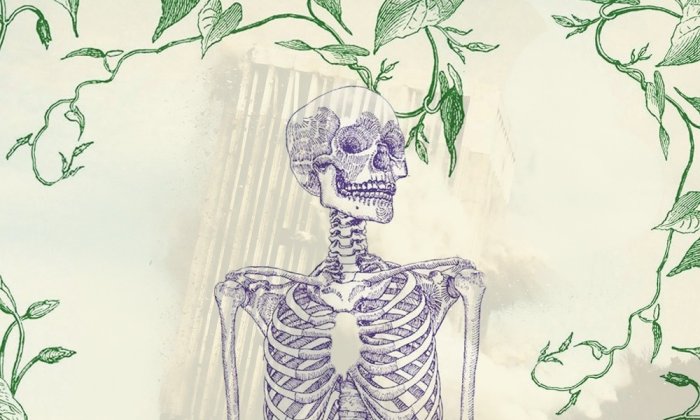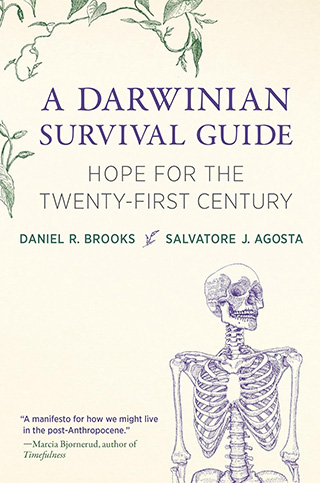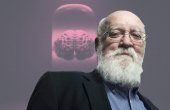The Collapse Is Coming. Will Humanity Adapt?

I’ve known Dan Brooks for 40 years now. Somehow we’re still talking to each other.
We’ve followed radically different trajectories since first meeting back in the ’80s. Dan built a truly impressive rap sheet of over 400 papers and book chapters, seven books, and too many awards, fellowships, and distinctions to count on your fingers and toes. I, in contrast, left academia in a huff (industry funding came with, shall we say, certain a priori preferences concerning the sort of results we’d be reporting) and became a science fiction writer. It’s a position from which, ironically, I’ve had more influence on actual scientists than I ever did as an academic — admittedly a low bar to clear.

And yet our paths continue to intersect. Dan offered me a post-doc in his lab around the turn of the century (DNA barcoding — I really, really sucked at it). A few years later I helped him relocate to Nebraska, leading to an encounter with the armed capuchins of the U.S. Border Patrol and eventual banishment from that crumbling empire. The protagonist of my novel “Echopraxia” is a parasitologist suspiciously named Daniel Brüks. And I once ended up one creepy handshake away from Viktor Orbán, when Dan finagled a speaking gig for me at Hungary’s iASK Symposium.
The dance continues. Sometimes we hug like brothers. Sometimes we feel like punching each other’s lights out (also, I suppose, like brothers). But one thing we never do is bore each other — and whenever Dan’s in town, we manage to meet up at a pub somewhere to reconnect. What follows is an edited record of one such meeting, more formal than most, which took place shortly after the publication of “A Darwinian Survival Guide.”
The following conversation was recorded in March 2024. It has been edited for clarity and length.
Peter Watts: In this corner, the biosphere. We’ve spent a solid year higher than 1.5 degrees Celsius; we’re wiping out species at a rate of somewhere between 10,000 and 100,000 annually; insect populations are crashing; and we’re losing the West Antarctic Ice Sheet, no matter what we do at this point. Alaskapox has just claimed its first human victim, and there are over 15,000 zoonoses expected to pop up their heads and take a bite out of our asses by the end of the century. And we’re expecting the exhaustion of all arable land around 2050, which is actually kind of moot because studies from institutions as variable as MIT and the University of Melbourne suggest that global civilizational collapse is going to happen starting around 2040 or 2050.
In response to all of this, the last COP was held in a petrostate and was presided over by the CEO of an oil company; the next COP is pretty much the same thing. We’re headed for the cliff, and not only have we not hit the brakes yet, we still have our foot on the gas.
In that corner: Dan Brooks and Sal Agosta, with a Darwinian survival guide. So, take it away, Dan. Guide us to survival. What’s the strategy?
Daniel Brooks: Well, the primary thing that we have to understand or internalize is that what we’re dealing with is what is called a no-technological-solution problem. In other words, technology is not going to save us, real or imaginary. We have to change our behavior. If we change our behavior, we have sufficient technology to save ourselves. If we don’t change our behavior, we are unlikely to come up with a magical technological fix to compensate for our bad behavior. This is why Sal and I have adopted a position that we should not be talking about sustainability, but about survival, in terms of humanity’s future. Sustainability has come to mean, what kind of technological fixes can we come up with that will allow us to continue to do business as usual without paying a penalty for it? As evolutionary biologists, we understand that all actions carry biological consequences. We know that relying on indefinite growth or uncontrolled growth is unsustainable in the long term, but that’s the behavior we’re seeing now.
“Darwin told us in 1859 that what we had been doing for the last 10,000 or so years was not going to work.”
Stepping back a bit. Darwin told us in 1859 that what we had been doing for the last 10,000 or so years was not going to work. But people didn’t want to hear that message. So along came a sociologist who said, “It’s OK; I can fix Darwinism.” This guy’s name was Herbert Spencer, and he said, “I can fix Darwinism. We’ll just call it natural selection, but instead of survival of what’s-good-enough-to-survive-in-the-future, we’re going to call it survival of the fittest, and it’s whatever is best now.” Herbert Spencer was instrumental in convincing most biologists to change their perspective from “evolution is long-term survival” to “evolution is short-term adaptation.” And that was consistent with the notion of maximizing short term profits economically, maximizing your chances of being reelected, maximizing the collection plate every Sunday in the churches, and people were quite happy with this.
Well, fast-forward and how’s that working out? Not very well. And it turns out that Spencer’s ideas were not, in fact, consistent with Darwin’s ideas. They represented a major change in perspective. What Sal and I suggest is that if we go back to Darwin’s original message, we not only find an explanation for why we’re in this problem, but, interestingly enough, it also gives us some insights into the kinds of behavioral changes we might want to undertake if we want to survive.
To clarify, when we talk about survival in the book, we talk about two different things. One is the survival of our species, Homo sapiens. We actually don’t think that’s in jeopardy. Now, Homo sapiens of some form or another is going to survive no matter what we do, short of blowing up the planet with nuclear weapons. What’s really important is trying to decide what we would need to do if we wanted what we call “technological humanity,” or better said “technologically-dependent humanity,” to survive.
Put it this way: If you take a couple of typical undergraduates from the University of Toronto and you drop them in the middle of Beijing with their cell phones, they’re going to be fine. You take them up to Algonquin Park, a few hours’ drive north of Toronto, and you drop them in the park, and they’re dead within 48 hours. So we have to understand that we’ve produced a lot of human beings on this planet who can’t survive outside of this technologically dependent existence. And so, if there is the kind of nature collapse that the Melbourne Sustainable Studies Institute is talking about, how are those people going to survive? A completely dispassionate view would just say, “Well, you know, most of them won’t. Most of them are going to die.” But what if it turns out that we think that embedded within all of that technologically dependent society there are some good things? What if we think that there are elements of that existence that are worth trying to save, from high technology to high art to modern medicine? In my particular case, without modern medical knowledge, I would have died when I was just 21 years old of a burst appendix. If I had managed to survive that, I would have died in my late 50s from an enlarged prostate. These are things most would prefer not to happen. What can we begin doing now that will increase the chances that those elements of technologically-dependent humanity will survive a general collapse, if that happens as a result of our unwillingness to begin to do anything effective with respect to climate change and human existence?
Peter Watts: So to be clear, you’re not talking about forestalling the collapse —
Daniel Brooks: No.
Peter Watts: — you’re talking about passing through that bottleneck and coming out the other side with some semblance of what we value intact.
Daniel Brooks: Yeah, that’s right. It is conceivable that if all of humanity suddenly decided to change its behavior, right now, we would emerge after 2050 with most everything intact, and we would be “OK.” We don’t think that’s realistic. It is a possibility, but we don’t think that’s a realistic possibility. We think that, in fact, most of humanity is committed to business as usual, and that’s what we’re really talking about: What can we begin doing now to try to shorten the period of time after the collapse, before we “recover”? In other words — and this is in analogy with Asimov’s Foundation trilogy — if we do nothing, there’s going to be a collapse and it’ll take 30,000 years for the galaxy to recover. But if we start doing things now, then it maybe only takes 1,000 years to recover. So using that analogy, what can some human beings start to do now that would shorten the period of time necessary to recover? Could we, in fact, recover within a generation? Could we be without a global internet for 20 years, but within 20 years, could we have a global internet back again?
Peter Watts: Are you basically talking about the sociological equivalent of the Norwegian Seed Bank, for example?
Daniel Brooks: That’s actually a really good analogy to use, because of course, as you probably know, the temperatures around the Norwegian Seed Bank are so high now that the Seed Bank itself is in some jeopardy of survival. The place where it is was chosen because it was thought that it was going to be cold forever, and everything would be fine, and you could store all these seeds now. And now all the area around it is melting, and this whole thing is in jeopardy. This is a really good example of letting engineers and physicists be in charge of the construction process, rather than biologists. Biologists understand that conditions never stay the same; engineers engineer things for, this is the way things are, this is the way things are always going to be. Physicists are always looking for some sort of general law of in perpetuity, and biologists are never under any illusions about this. Biologists understand that things are always going to change.
Peter Watts: Well, that said, that’s kind of a repeated underlying foundation of the book, which is that evolutionary strategies are our best bet for dealing with stressors. And by definition, that implies that the system changes. Life will find a way, but it won’t necessarily include the right whales and the monarch butterflies.
Daniel Brooks: Right, right. Yeah.
Peter Watts: And you take on quite explicitly the neo-protectionists, who basically want to preserve the system as it exists, or as it existed at one point in the idealized past, forever without end, as opposed to allowing the system to exercise its capacity to change in response to stress. You cite anoxic ocean blobs; you cite, quite brilliantly I thought, the devastating effect beavers have on their local habitat.
Daniel Brooks: Yeah.
Peter Watts: And you take on the sacred spirit animal of the World Wildlife Fund, the polar bear. And the bottom line here is that shit happens, things change, trust life to find a way, ‘cause evolution hasn’t steered us wrong yet.
Daniel Brooks: Yeah.
Peter Watts: Now, this is an argument that some might say is invasible by cheaters. I read this and I thought of the Simpsons episode where Montgomery Burns is railing to Lisa, and he says, “Nature started the struggle for survival, and now she wants to call it off because she’s losing? I say, hard cheese!” And less fictitiously, Rush Limbaugh has invoked essentially the same argument when he was advocating against the protection of the spotted owl. You know, life will find a way. This is evolution; this is natural selection. So, I can see cherry-picking oil executives being really happy with this book. How do you guard against that?
Daniel Brooks: Anybody can cherry-pick anything, and they will. Our attitude is just basically saying, look, here’s the fundamental response to any of this stuff. It’s, how’s it working out so far? OK? There’s a common adage by tennis coaches that says during a match, you never change your winning game, and you always change your losing game. That’s what we’re saying.
One of the things that’s really important for us to focus on is to understand why it is that human beings are so susceptible to adopting behaviors that seem like a good idea, and are not. Sal and I say, here are some things that seem to be common to human misbehavior, with respect to their survival. One is that human beings really like drama. Human beings really like magic. And human beings don’t like to hear bad news, especially if it means that they’re personally responsible for the bad news. And that’s a very gross, very superficial thing, but beneath that is a whole bunch of really sophisticated stuff about how human brains work, and the relationship between human beings’ ability to conceptualize the future, but living and experiencing the present.
There seems to be a mismatch within our brain — this is an ongoing sort of sloppy evolutionary phenomenon. So that’s why we spend so much time in the first half of the book talking about human evolution, and that’s why we adopt a nonjudgmental approach to understanding how human beings have gotten themselves into this situation. Because everything that human beings have done for 3 million years has seemed like a good idea at the time, but it’s only been in the last 100 or 150 years that human beings have begun to develop ways of thinking that allow us to try to project future consequences and to think about unanticipated consequences, long-term consequences of what we do now. So this is very new for humanity, and as a consequence, it’s ridiculous to place blame on our ancestors for the situation we’re in now.
“We’re hoping that people will begin seriously thinking that our short-term well-being is best served by thinking about our long-term survival.”
Everything that people did at any point in time seemed like a good idea at the time; it seemed to solve a problem. If it worked for a while, that was fine, and when it no longer worked, they tried to do something else. But now we seem to be at a point where our ability to survive in the short term is compromised, and what we’re saying is that our way to survive better in the short term, ironically, is now based on a better understanding of how to survive in the long run. We’re hoping that people will begin seriously thinking that our short-term well-being is best served by thinking about our long-term survival.
Peter Watts: What you’ve just stated is essentially that short-term goals and long-term goals are not necessarily the same thing, that one trades off against the other. When you put it that way, it seems perfectly obvious — although I have to say, what you’re advocating for presumes a level of foresight and self-control that our species has, shall we say, not traditionally manifested. But yeah, a widely adhered-to view of evolution is a reactive one— the pool is drying up, and evolution looks at that and says, oh my goodness, the pool is drying up! We should probably get those fish to evolve lungs. Whereas what evolution actually does is say, oh look, the pool is drying up! Good thing that fish over in the corner that everybody picked on has a perforated swim bladder; it might be able to, like, breathe air long enough to make it over to the next pool. Too bad about all those other poor bastards who are going to die. And to hone that down to a specific example that you guys cite in the book, you’re saying “high fitness equals low fitness” — that you need variation to cope with future change.
Daniel Brooks: Right.
Peter Watts: So optimal adaptation to a specific environment implies a lack of variation. When you’re optimally adapted to one specific environment, you are screwed the moment the environment changes. And the idea that high fitness equals low fitness is what I call a counterintuitive obvious point: It is something that seems oxymoronic and even stupid when you first hear it, but when you think about it for more than two seconds, it’s like — who was it that responded to “The Origin of Species” by saying, Of course! How silly of me not to have thought of it myself. I’ve forgotten who said that.
Daniel Brooks: A lot of biology professors, who then wrote articles about how they actually had thought of it for themselves, but nobody paid any attention to that!
Peter Watts: And that might be one of the more essential values of this book — that it reminds us of things we should already know, but never thought about rigorously enough to actually realize.
Shifting gears to another key point in the book, democracy, which you describe as the one form of government that allows the possibility of change without violence. But you also admit — and this is a quote: “Our governance systems, long ago coopted as instruments for amplified personal power, have become nearly useless, at all levels from the United Nations to the local city council. Institutions established during 450 generations of unresolvable conflict cannot facilitate change because they are designed to be agents of social control, maintaining what philosopher John Rawls called ‘the goal of the well-ordered society.’ They were not founded with global climate change, the economics of wellbeing, or conflict resolution in mind.” So what you are essentially saying here is that anyone trying to adopt the Darwinian principles that you and Sal are advocating is going to be going up against established societal structures, which makes you, by definition, an enemy of the state.
Daniel Brooks: Yes.
Peter Watts: And we already live in a world where staging sit-down protests in favor of Native land rights or taking pictures of a factory farm is enough to get you legally defined as a terrorist.
Daniel Brooks: That’s right. Yeah.
Peter Watts: So, how are we not looking at a violent revolution here?
Daniel Brooks: That’s a really good point. I mean, that’s a really critical point. And it’s a point that was addressed in a conference a year ago that I attended, spoke in, in Stockholm, called “The Illusion of Control,” and a virtual conference two years before that called “Buying Time,” where a group of us recognized that the worst thing you could do to try to create social change for survival was to attack social institutions. That the way to cope with social institutions that were non-functional, or perhaps even antithetical to long-term survival, was to ignore them and go around them.
So let me give you an example: I was speaking with member representatives of a rural revitalization NGO in Nebraska a year ago, and they said, “OK, this rural revitalization stuff and climate migration, this sounds like a really good idea. How are we going to get the federal government to support these efforts?” And I said, “They’re not going to.” I said, “You have to understand that in the American situation, the two greatest obstacles to rural revitalization and climate migration are the Republican Party and the Democratic Party. The Democratic Party is a party of big cities; they don’t want to lose population. The Republican Party is the population of the rural areas; they don’t want people from the cities moving into their areas. Both parties are going to be against this. This is why Joe Biden’s, you know, ‘the climate president,’ but he’s not doing nearly enough. Not even close. Because these people are all locked into the status quo.” And so I told these people, I said, “You don’t ask for permission, and you don’t go to the federal government. You go to the local towns in these rural areas and you say, ‘What do you need? What do you want?’ You then advertise for the kinds of people you want to come in. You want to have electricity self-sufficiency in your town. You need somebody who knows how to build and maintain a solar farm. Advertise for people like that in the big cities. Get them to come and live in your town. Don’t ask the government; do the right thing. Never ask for permission; just do the right thing. They’re not going to pay any attention to you.” And these people said, “Yes, but then if we’re successful, the politicians will come in and claim credit!” And I said, “So what? Who cares! Let them come in, do a photo op, and then they go back to Washington D.C. and they’ll forget you.”
Peter Watts: Maybe. But in cases where it’s been tried, the power utilities step in and squash such efforts as though they were bugs. Set up solar panels and the utility will charge you for “infrastructure maintenance” because by opting out of the grid, you’re not paying “your fair share.” Drive an electric vehicle and you might be subject to an additional “road tax” because, by not paying for gasoline, you’re not paying for road work. The system actively works to make these initiatives fail. And this power goes beyond just stifling progress. They have control of armed forces; they have a monopoly on state violence. We are not allowed to beat up the cops; the cops are allowed to beat us up.
Daniel Brooks: I suppose I have more faith in human nature than is warranted by the evidence. Sal and I do not think such local initiatives will be easy or that they will mostly succeed — at least not until things are so bad that they are the only workable option. What we are saying is that these local initiatives are the Darwinian response to trouble (move away from trouble, generalize in fitness space, and find something that works), and if we recognize trouble early enough, we can opt to begin surviving now. At the same time, during climate perturbations, lots of organisms do not make it, so we need as many individual efforts as possible to increase the chances that someone will survive.
“Local initiatives are the Darwinian response to trouble, and if we recognize trouble early enough, we can opt to begin surviving now.”
There is evidence that some people are doing this, sometimes with the blessing of local and state authorities and without arousing the interest of national authorities. What people need to do is have a commitment to survival, decide what their assets are and their local carrying capacity, and then go about doing the right thing as quietly as possible. As for your point about state violence: What happens if the cops in a small town are the people you go to church with?
Peter Watts: That’s an interesting question.
Daniel Brooks: That’s the point. I mean, what we’re trying to find out, one of the experiments that rural revitalization and, and climate migration is going to resolve for us, is, what is the largest human population that can safeguard itself against being taken over by sociopaths? Let me explain what I mean. Generally speaking, the larger the population, the smaller the number of people who actually control the social control institutions. So you have five different language groups in the city, but somehow it turns out that the people in charge of the religion, or the banks, or the governance only represent one of those language groups. They end up controlling everything. This is a breeding ground for sociopaths to take control. And sure enough, by about 9,000 years ago, when this is all in place, we begin to see religious and governance and economic institutions all support the notion of going to war to take from your neighbors what you want for yourself. And we’ve been at war with ourselves ever since then, and this was not an evolutionary imperative; this was a societal behavioral decision. It’s understandable, in retrospect, as a result of too many people, too high a population density. So you live in circumstances where people cannot identify the sociopaths before they’ve taken control. And that’s the subtext in the idea that one of the ways that we should deal with the fact that more than 50 percent of human beings now live in large cities in climate-insecure places, is for those people to redistribute themselves away from climate-insecure areas, into population centers of lower density, and cooperating networks of low-density populations, rather than big, condensed cities.
Peter Watts: Let’s follow this move back to the rural environment a bit, because it’s fundamental. I mean, you brought it up, and it is fundamental to the modular post-apocalyptic society you’re talking about.
Daniel Brooks: Sure. Not post-apocalyptic: post-collapse.
Peter Watts: Post-collapse. Fair enough.So, another quote from the book: “Neo-protectionists compliment the ever-larger city’s perspective by suggesting that the biosphere would be best served if humans were maximally separated from the wild lands.”
Daniel Brooks: Right.
Peter Watts: “This makes no sense to most humans, and that is why no post-apocalyptic or dystopian novel or film depicts large cities as places of refuge and safety during a crisis.” Just putting up my hand, I can vouch for that, having written my share of apocalyptic sci-fi.
Daniel Brooks: Nobody’s running to the cities.
Peter Watts: “Any attempt to separate humans from the rest of the biosphere would be detrimental to efforts to preserve either.” And I believe at some other point you reference neo-protectionist arguments that we should put aside half of the natural life —
Daniel Brooks: Yeah. That’s E.O. Wilson’s half —
Peter Watts: And putting aside, for the moment, my sympathies for that sentiment — in defense of the neo-protectionists, all of human history says that whenever we interact with nature, we pretty much fuck it up.
Daniel Brooks: No. It doesn’t say that. First of all, when you talk of most of human history, you’re talking about the last thousand years, 2,000 years, 3,000 years. What has been the actual historical record of humans for the last 3 million years?
Peter Watts: I take your point. And it’s a legitimate point when you talk about a global human population, that you mention, in the millions. But we’re at a population of 8 billion now. So accepting, wholesale, without argument, your argument that cities are basically wasteful, unsustaining, pestholes of disease and so on —
Daniel Brooks: That benefit a few people a lot, and treat the great majority as a disposable workforce.
Peter Watts: Yeah. But we still are dealing with a planet in which 94 percent of mammalian biomass on this planet is us and our livestock, so how does that kind of biomass integrate intimately with what remains of our natural environment without just crushing it — or are you anticipating, like, a massive cull of a —
Daniel Brooks: But, see, you’re repeating a bunch of truisms that are not borne out by the actual evidence. We don’t crush — Homo sapiens doesn’t crush the biosphere. Homo sapiens interacts with the biosphere in ways that alter it. See, evolutionary alteration of the environment does not mean collapse. It means change. This is the neo-protectionist language — that any change is going to collapse the biosphere. That’s bullshit. I mean, what human beings are doing to the biosphere right now is nothing compared to what blue-green algae did to the biosphere 4 billion years ago.
“This is the neo-protectionist language — that any change is going to collapse the biosphere. That’s bullshit.”
Peter Watts: Absolutely.
Daniel Brooks: And what happened? Us, OK? The Chicxulub asteroid: If it hadn’t killed the dinosaurs, there would be no us.
Peter Watts: I actually, personally, find comfort in the idea that there have been, what, five major extinction events? And that in every single case, there has been a beautiful, diverse —
Daniel Brooks: Because there was sufficient evolutionary potential to survive.
Peter Watts: Exactly.
Daniel Brooks: Not because a whole bunch of new magical mutations showed up.
Peter Watts: Right. But, it took anywhere from 10 to 30 million years for that to happen —
Daniel Brooks: So?
Peter Watts: — and I would argue that most people — I mean, I’m kind of on your side in this, but I’m also increasingly sympathetic to the human extinction movement. I think most people are hoping for recovery in less geological terms, timescale-wise.
Daniel Brooks: This is a really critical point, because this, then, loops back to the whole Asimov’s Foundation thing. Do we wait 30,000 years for the empire to rebuild, or can we do it in 1,000 years? That’s what we’re talking about. We have great confidence that the biosphere is going to restore itself, within — you know, no matter what we do, unless we make the whole planet a cinder, the biosphere’s going to “restore itself” within, you know, 10 million years. Whatever. That’s fine. And we — you know, some form of humanity — may be part of that, or may not. But the reality is that what we want to do, as human beings, is we want to tip the odds in our favor a little bit. We want to increase the odds that we’re going to be one of those lucky species that survives. And we know enough to be able to do that. We know now enough about evolution to be able to alter our behavior in a way that’s going to increase the odds that we’ll survive. So the question is, are we going to do that? So this whole business of whether or not, you know, what’s going to happen in 3 million years — you’re right: That’s not important. But what happens tomorrow is not important either. What’s important is what happens in the first generation after 2050. That’s what’s important. That first generation after 2050 is going to determine whether or not technological humanity reemerges from an eclipse, or whether Homo sapiens becomes just another marginal primate species.
Peter Watts is a Hugo Award-winning science-fiction author and a former marine biologist. His most recent novel is “The Freeze-Frame Revolution” (Tachyon).
Daniel R. Brooks is Professor Emeritus, University of Toronto, Senior Research Fellow, H. W. Manter Laboratory of Parasitology, University of Nebraska State Museum, and Fellow of the Stellenbosch Institute for Advanced Study (STIAS). He is the co-author of “The Stockholm Paradigm” (University of Chicago Press), “The Major Metaphors of Evolution” (Springer), and, most recently, “A Darwinian Survival Guide.”



